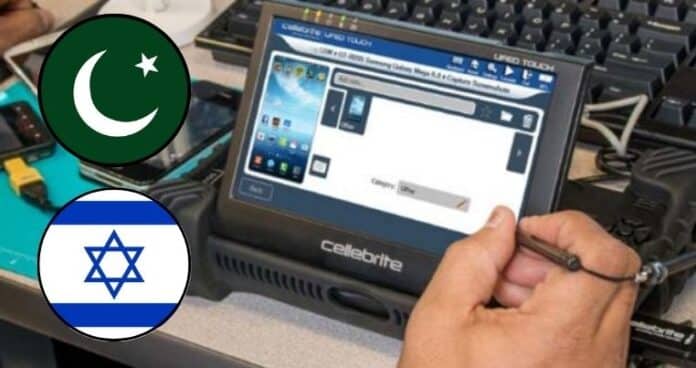Israel’s longest-running newspaper, Haaretz, has revealed that various Pakistani intelligence agencies use devices developed by the Israeli cybertechnology firm Cellebrite. These products mainly include phone-hacking tools which are eventually used against the citizens, violating their rights. According to the report, the Federal Investigation Agency (FIA) and various police units within Pakistan have been utilizing these products since 2012.
Numerous reports have highlighted Cellebrite’s association with oppressive regimes that are or have been under sanctions, including Belarus, China (including Hong Kong), Uganda, Venezuela, Indonesia, the Philippines, Russia, Ethiopia, and Bangladesh’s Rapid Action Battalion (RAB). Human rights organizations have urged their respective Defense Ministries to cease the Israeli company from selling its controversial products to powerful agencies, citing rights abuses.
There are concerns about the potential misuse of Cellebrite’s tools by governments known for human rights violations. Pakistan’s history is marred by such cases, which intensifies the already growing concern about Israel’s cybertechnologies.
Why Israeli Cybertech in Pakistan is Alarming?
The publicly traded company on the Nasdaq, Cellebrite, is renowned for its flagship product UFED (Universal Forensic Extraction Device), which makes it possible to access password-protected mobile devices and extract comprehensive data such as images, texts, documents, call logs, and contacts.
Cellebrite, under the leadership of CEO Yossi Carmil, claims that its products are exclusively supplied to police departments and security forces to combat serious crimes like terrorism. However, law enforcement agencies have been known to misuse the capabilities of Israeli cybertech for purposes beyond intended use. It has also been found in the possession of those who suppress journalists, human rights activists, minorities, and the LGBTQ community.
In 2019, the Indian government reportedly used NSO Group’s Pegasus spyware to target journalists, human rights activists, and political opponents. The spyware was purportedly used to surveil and intercept communications, raising concerns about privacy and freedom of speech.
Moreover, the Saudi government has been accused of using Pegasus spyware to target and surveil dissidents. The most prominent target was the journalist Jamal Khashoggi, who was later murdered in the Saudi consulate in Istanbul, Turkey. While the direct link between the spyware and the murder is still debated, the incident highlighted the potential risks of surveillance technology falling into the wrong hands.
What Is Pakistan Doing with It?
Pakistan’s security forces have a history of serious human rights violations and infringements on freedom of expression. The US State Department’s 2022 human rights report on Pakistan highlights these issues, including extrajudicial killings, forced disappearances, torture, arbitrary detention, and restrictions on free expression. In 2016, Pakistan enacted the Pakistan Electronic Crimes Act (PECA), which has further curtailed online freedom of expression and enabled strict online censorship without court orders.
The employment of Israeli cybertech in Pakistan raises fears for dissidents, journalists, and activists critical of the government and security forces. The vague provisions of PECA have been used to silence freedom of expression under the pretext of combating “fake news” and cybercrime. The law has been instrumental in the persecution of journalists and the expansion of government surveillance.
Critics have also raised concerns about Cellebrite’s systems potentially aiding in persecuting various groups and individuals, including women, religious minorities, journalists, and opposition activists. Despite increasing calls against the proliferation of surveillance technology, Cellebrite continues to sell products to agencies in Pakistan via its Singapore subsidiary.
How Does Israel’s Phone Hacking Device Work?
The hacking tool requires physical access to the target mobile device. This means that the device must be physically connected to the UFED or another compatible system. Once connected, the UFED software initiates the extraction process. It can bypass the phone’s security mechanisms and retrieve various types of data, including text messages, call logs, contacts, images, videos, application data, location history, and more.
UFED employs various techniques to bypass security measures such as PIN codes, passwords, biometric locks (such as fingerprints or facial recognition), and encryption. It takes advantage of vulnerabilities and exploits to gain access to the device’s internal storage. Then it creates a forensic image or backup of the device’s data. This image is a snapshot of the device’s storage, preserving the data in its original state for further analysis.
Once the data is extracted, the hacker, or in this context, the analyst can use Cellebrite’s software to study the retrieved information. This analysis can provide insights into the target’s activities, communications, and interactions. The software also generates detailed reports, summarizing the extracted data. These reports can be used as evidence in legal proceedings or investigations.
It’s important to note that the effectiveness of Cellebrite’s device depends on various factors, including the device’s make and model, the operating system version, and the security measures in place. As mobile devices and operating systems evolve and incorporate stronger security features, forensic tools like UFED may encounter challenges in extracting data from newer devices.
What is the Relationship Between Israel and Pakistan?
The report also sheds lights on the controversial relationship between Israel and Pakistan. On paper, Pakistani passport restricts travel to Israel because of the Palestine cause, but past reports have suggested periodic engagements between the two countries.
There have been several instances of unofficial exchanges between citizens of the two countries. Some Pakistani journalists, academics, and civil society members have reportedly visited Israel for conferences, seminars, and other activities. However, these interactions are relatively rare and often met with controversy within Pakistan. When Pakistani anchor Mubasher Lucman appeared on Israeli TV channel and supported the idea of bilateral ties, he had to face criticism on social media.
The meetings or engagements are mostly kept discreet to avoid such loud backlash. There could be many reasons for two rival nations to contact each other. For example, both countries have faced common security challenges, such as terrorism and radicalism. There have been speculations that the cooperation might occur in the realm of intelligence sharing. However, these reports are often difficult to verify as officials from both sides deny them.


